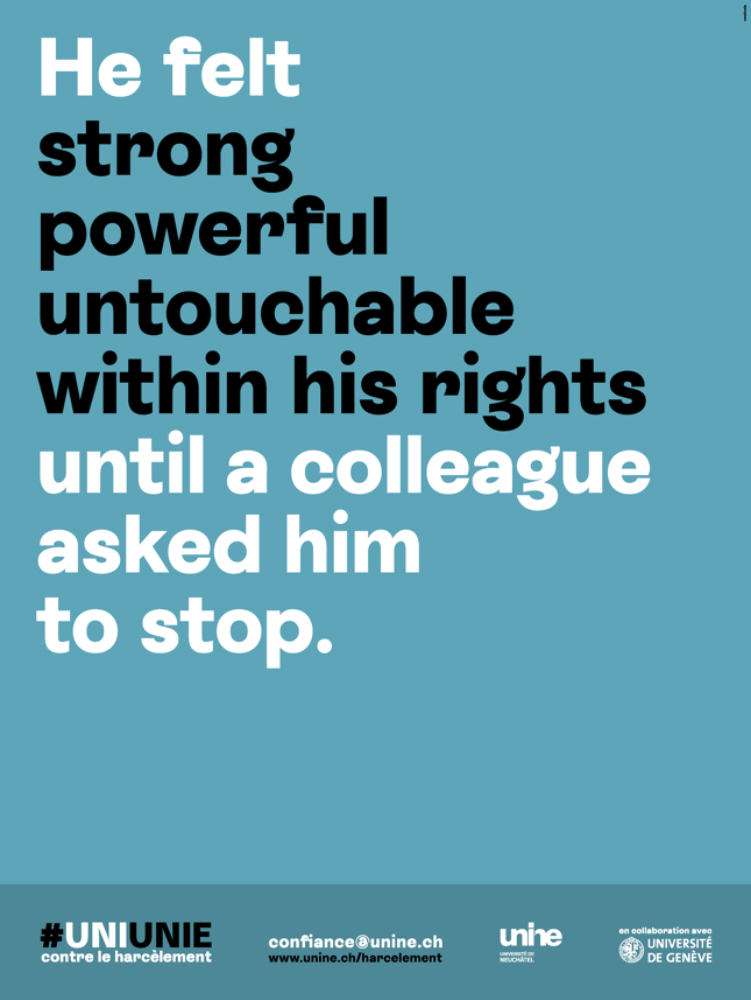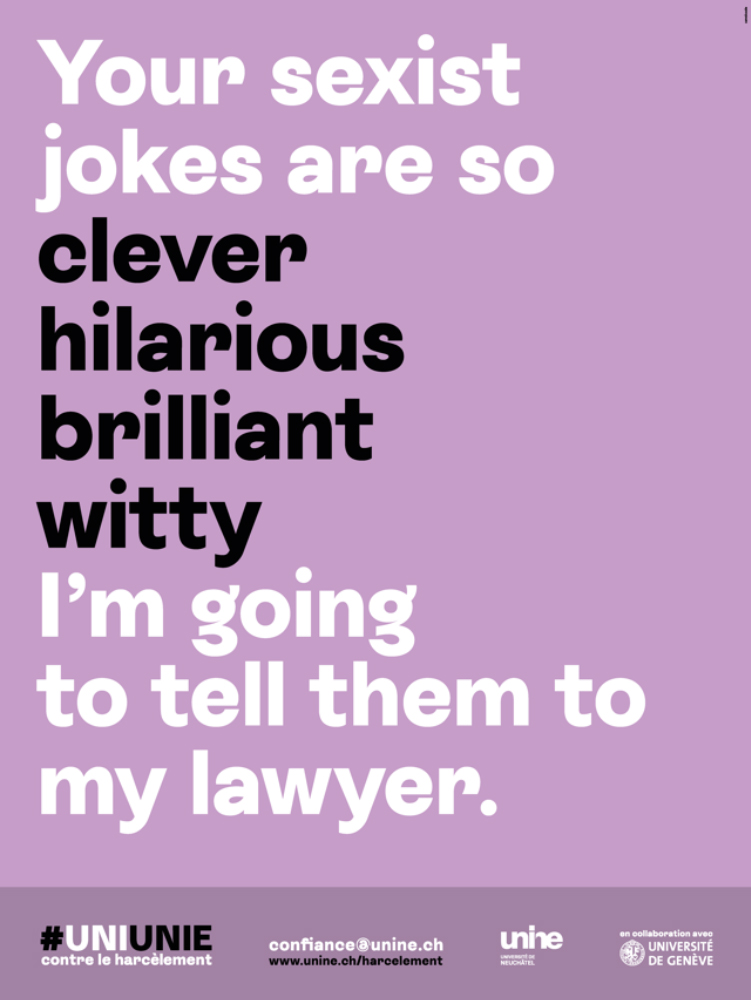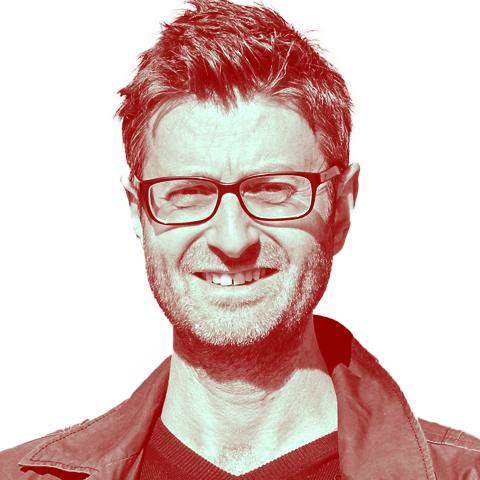
Swiss universities are tackling sexual harassment. Are they getting it right?

The #metoo movement has pushed universities to react to sexual harassment. But students and staff at Swiss universities say more needs to be done.
Last June, Corinne Charbonnel, a 57-year-old French professor of astrophysics at the University of Geneva, found the courage to let out her cry of pain. Speaking in front of an attentive and almost all-female audience during a conference in Geneva about sexual harassment in academia, her voice cracked as she spoke of what some women scientists have had to endure during their careers.
Charbonnel took up the role of mentor for other women scientists ten years ago. During that time, she supported around 60 mentees at various stages of their careers, from PhD students to junior professors. Unlike a grievance officer, who collects complaints, a mentor gives advice on how to write grants or how to obtain research collaborations, for example.
“Women apply to mentoring programmes because they want a career in academia, not because they have problems,” says Charbonnel. Harassment emerges as their careers progress. She recalls approximately 15 cases of harassment of which five had a sexual component.
Sexual harassment is not new. But what is new is awareness about its scale, which grew with the emergence of #metoo, a social movement against systemic sexual abuse and harassment that started in 2006 and became a viral campaign in Hollywood in 2017.
“In the last years my mentees started questioning behaviours instead of just accepting them,” says Charbonnel.

Recognising the problem
Five years after the #metoo hashtag became a global phenomenon, many academic institutions have acknowledged the problem and say they are committed to tackling harassment with a flurry of initiatives. These range from implementing codes of conduct to dedicated courses for students and employees, as well as “zero-tolerance policy” slogans and campaigns.
The conference held in Geneva in June 2022 was the third event on gender issues in academia organised by the League of European Research Universities (LERU), a network of 23 European universities, including Geneva and Zurich. For the first time the league discussed how to prevent and tackle sexism and sexual harassment in higher education institutions. The next conference will take place in 2024.
But students, staff and scientists say much of what is being done is window-dressing. They demand universities stay true to their commitments to make academia a better place.
In 2019, the University of Basel and the federal technology institute ETH Zurich were criticised publicly for their handling of sexual harassment cases. Experts singled out the lack of transparency (the victims were not informed about the proceedings), the length of the investigation and the fact that the perpetrators received only minor sanctions.
“Sexual harassment, sexism and discrimination have a huge impact for the future of our society and for the lives of people who study and work in universities,” Yves Flückiger, the rector of the University of Geneva and former president of swissuniversities, the umbrella body for Swiss universities, toldExternal link the conference in Geneva. “When it comes to sexual harassment, all universities must be beyond reproach.”
In 2019, Esther Uzar, a PhD student at the University of Basel, shared her story with the media. For five years her supervisor, a professor, harassed her with endless requests for a sexual relationship. She found the courage to denounce him; the professor received a written warning from the university and was stripped of management functions, but he still teaches at the university. After seven years of working on her PhD, Uzar left the university – without a degree.
Another case emerged the same year concerning an architecture professor at ETH Zurich, who allegedly harassed students, employees and PhD students. The ETH investigated the case and, after hearing 13 witnesses for over 42 hours, concluded that the professor violated ETH compliance rules but that there was no case for sexual harassment.
A global issue
Sexual harassment in universities is neither a Swiss problem nor specific to academia; it’s present in all sectors of society, from dance companies to multinationals. Recent data show that more than 5% of PhD students in France have been sexually harassed. In the United States, more than 20% of female students have been victims of sexual assault or misconduct.
In Switzerland there are no national statistics on harassment of university students or academic staff. But a recent surveyExternal link by Amnesty International Switzerland of about 4,500 Swiss women shows that one-third have experienced sexual harassment in the workplace. An independent and anonymous surveyExternal link published in December 2022 by the University of Lausanne discovered nearly 150 acts of criminally relevant sexual harassment, including four rapes.
Real numbers about the phenomenon are thought to be higher, as cases are often underreported. Many victims are unaware what sexual harassment really is. The definition ranges from sexist jokes to unwanted touching and kissing, and rape. And even if victims are aware, they often choose to remain silent or refuse to take part in an investigation.
“They fear the consequences to their career should they be seen as whistle-blowers,” says Louise Carvalho, Diversity & Inclusion Programme Leader at the European Organization for Nuclear Research (CERN) in Geneva.
It’s not about sex, it’s about power
Vertical hierarchies, precariousness and fierce competition for grants and jobs create a fertile ground for harassment in academia. The perpetrators are usually men in a position of power – although women are not exempted.
“It’s not only about sex, it’s about power,” Carvalho says.
With lowly positions on the academic ladder, PhD students are overly exposed. They may find themselves in a vulnerable position due to a precarious work contract or being dependent on a professor who sits on an examination panel with the power to approve or turn down their doctoral degree – a common practice in Switzerland and Germany.
Christine*, a PhD student in a Swiss university, was harassed by a well-known professor during and after an international conference. He sent her multiple unsolicited emails. Christine reported the case to a counsellor at her Swiss university, who didn’t take it seriously. As a result, she decided to change her field of study. “What if a paper or a grant of mine landed on his desk? He could have rejected it out of spite,” she tells SWI swissinfo.ch.
Hidden costs
The personal costs for victims are huge. A 2016 internal study by the University of Geneva found that victims of harassment have to cope with depression, post-traumatic stress disorder and a risk of not being able to pursue their career. They may also end up facing legal costs of CHF20,000 ($21,500) or more. “All my mentees who were subject to harassment, psychological or sexual, had to cope with depression,” Charbonnel told the conference in Geneva.
Swiss law explicitly protects employees from sexual harassment in the workplace (Article 4 of the Gender Equality Act). But the legal process is “difficult, risky, expensive, lonely, and very long” for any victim of sexual harassment who takes their employer to court, Irène Schmidlin, a lawyer and “independent person of trust” at the University of Lausanne, told the Geneva conference.
Swiss courts rarely decide in favour of an employee. According to a survey, only 18% of sexual harassment cases dealt by cantonal courts result in a favourable outcome for the harassed person. If the case reaches the Federal Court, the employee has still less than a 50% chance of receiving a positive verdict. A positive outcome means up to six months’ salary in compensation.
If they lose (at the cantonal level), the employee has to pay for their own lawyer and up to CHF19,000 towards the other person’s legal costs. A legal proceeding lasts on average four years, but in someExternal link cases can take eight years.
The main problem of bringing a case of sexual harassment to court is that there are rarely any witnesses or direct proof. “Court cases are usually difficult, even more so for sexual harassment,” says Schmidlin. To best prepare a case she suggests looking for witnesses, keeping a factual diary of the events and detailing all the possible evidence, from text messages to doctor’s visits related to the case.
Institutions are also paying a price for harassment, both in terms of reputation and legal fees. The hidden costs comprise employment turn-over, loss of talent and know-how, and lower productivity from the group where sexual harassment took place. The International Centre for Research on Women estimates the loss in productivity for a harassment case at $22,500 (CHF21,000) a year.
Reputations are at stake too. Confronted with a sexual harassment case and a possible scandal, institutions may be tempted to choose shortcuts such as undermining the problem and not holding the perpetrator accountable because that person has “power and reputation, brings grants, or is close to retirement”, says Charbonnel. How institutions handle cases can be just as detrimental to their reputation as the case itself.
Campaigning for awareness and trust
Academic institutions are reacting. One year after the 2016 internal report which pointed to the personal cost of harassment, the University of Geneva launched an information and awareness campaign called #UNINIE. Other Swiss universities followed suit. The first national Sexual Harassment Awareness Day will take place on March 23, with events and actions at various Swiss universities.


Campaigns have the benefit of raising awareness and creating the space for victims to speak. The 2017 campaign at the University of Basel encouraged Esther Uzar, a PhD student, to report that she had been sexually harassed for five years by a professor.
Soon after her case, the university revised regulations for the protection of personal integrity, drafted a code of conduct and created the position of “personal integrity coordinator” to help people in need. It also added a series of training courses for employees and students.
“The data [about the impacts of sexual harassment] are clear. It’s useless to fight against them. Instead, we should concentrate on sexism, harassment, and discrimination and adopt a ‘zero tolerance’ policy,” Flückiger told the Geneva conference.
To train or not to train
Another way to raise awareness and trust is education. Several institutions, such as the universities of Geneva and Basel, and the federal institutes of technology EPFL in Lausanne and ETH Zurich, are offering courses on how to spot sexual harassment, how to react and how to denounce it. They are mostly voluntary.
However, the impact of such initiatives is unclear. Research by sociologists Frank Dobbin and Alexandra Kalev, two Harvard scholars, shows that training courses intended to educate about harmful behaviour can cause a backlash and potential harassers may become more accepting of their own behaviour. “Start any training course by telling a group of people that they’re the problem, and they’ll get defensive,” they wrote in a Harvard Business Review article. Making it mandatory just aggravates the message that men are “villains” that need fixing.
Instead, the authors recommend training for managers and bystanders. Harassment is a challenge that all managers must deal with. Bystander training treats trainees as collaborators in fighting harassment and offers tools for intervening. The motto is: “If you see something, say something”.
CERN and the University of Basel have embraced that approach. “We want to equip the 90% of people who promote good behaviour by teaching them how to be an active bystander. Step up and call it out – this is how we can de-escalate and reduce misconduct at work,” says Carvalho.

Be serious or be sacked
But courses and campaigns aren’t enough, argue experts. Campaigns risk talking primarily to those already converted to the cause and annoying the people they want to warn.
“Honestly, no one reads a code of conduct,” says Christine, the PhD student who shared her harassment case with SWI. She welcomes the creation of ad-hoc independent offices for anonymous complaints but doesn’t trust internal ones; she fears that institutions may be tempted to brush compromising cases under the carpet.
People on the ground say more structural and cultural changes are needed. For example, reducing precariousness would be a good way to minimise the dependency of PhDs, postdocs and junior professors on the influence of their hierarchies.
And having more diversity at the top, including, of course, more women, would help to curb sexual harassment, according to Dobbin and Kalev.
While waiting for structural changes, students, researchers and experts in sexual harassment are asking academic managers (rectors, deans, presidents and board members) to follow through on their promise of a “zero-tolerance policy”, and to be accountable leaders that drive the change.
“No matter how brilliant a scientist, harassment of others in pursuit of excellence is not acceptable,” Carvalho said. “Role-modelling respect for others in the workplace: that is a standard of excellence worth pursuing.”
Edited by Virginie Mangin
* name withheld

More
What to do if sexual harassment happens to you

In compliance with the JTI standards
More: SWI swissinfo.ch certified by the Journalism Trust Initiative































You can find an overview of ongoing debates with our journalists here . Please join us!
If you want to start a conversation about a topic raised in this article or want to report factual errors, email us at english@swissinfo.ch.